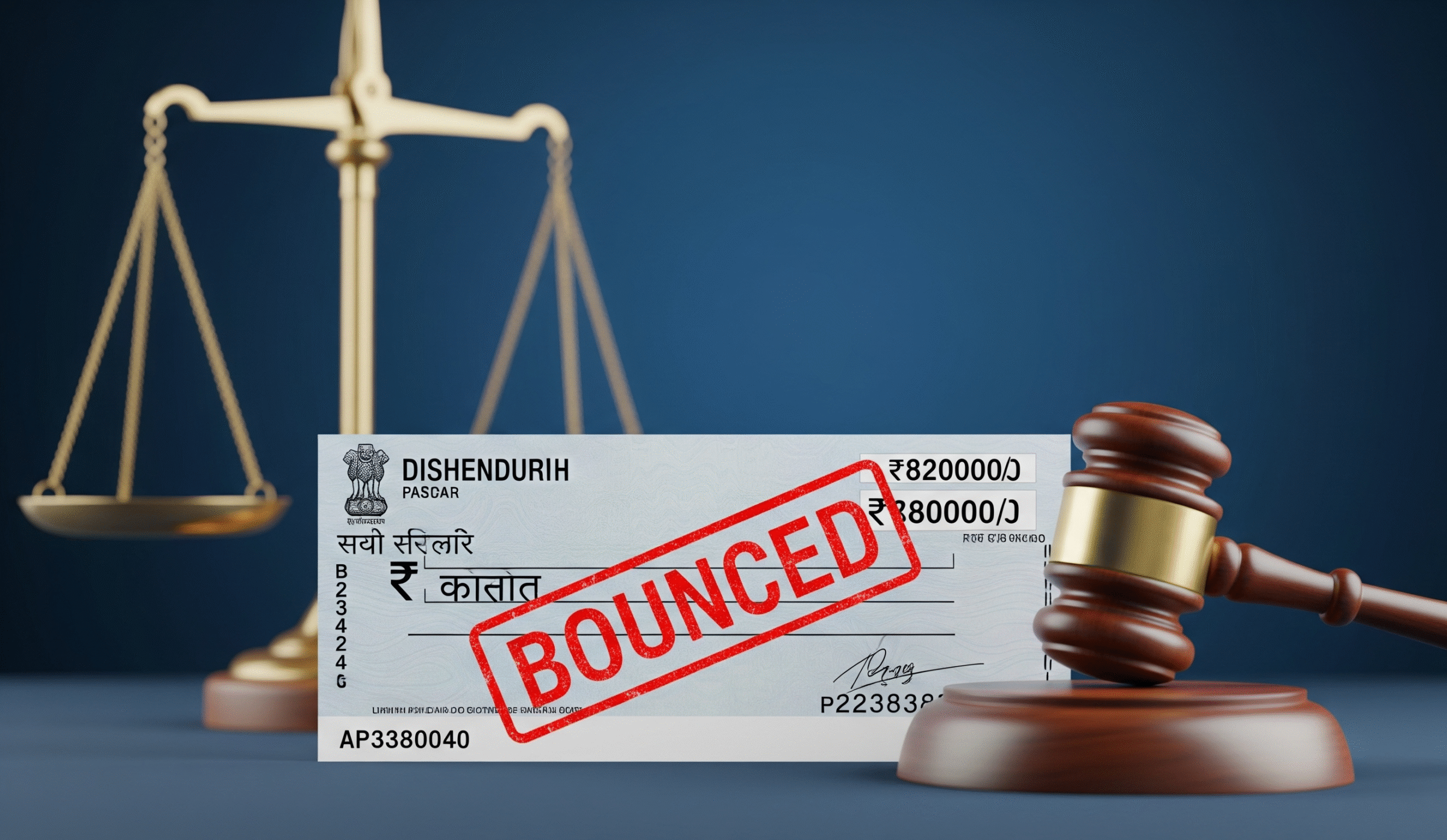Cheque bounce cases are among the most common legal disputes in India. Section 138 of the Negotiable Instruments Act, 1881 (NI Act) specifically deals with the offence of dishonour of cheques. This guide explains the law, procedure, and remedies available step by step.
What Is Section 138 of the NI Act?
Section 138 makes it a criminal offence if a cheque issued for the payment of a debt or liability is dishonoured due to:
- Insufficient funds, or
- Exceeding the account’s arrangement with the bank.
Punishment:
- Imprisonment up to 2 years, or
- Fine up to twice the cheque amount, or
- Both.
Conditions to File a Cheque Bounce Case
To initiate a case under Section 138:
- The cheque must be issued towards a legally enforceable debt or liability.
- The cheque should be presented to the bank within 3 months of its issue.
- If dishonoured, the payee must obtain a bank return memo.
- The payee must send a legal demand notice within 30 days of receiving the memo.
- The drawer must fail to pay within 15 days of receiving the notice.
Only if all the above are satisfied can a case be filed.
Step-by-Step Legal Process
Presentation of Cheque
- Deposit the cheque in the bank within its validity period (3 months from the date of issue).
Dishonour & Bank Memo
- If the cheque bounces, the bank issues a Cheque Return Memo mentioning the reason for dishonour.
Sending Legal Notice
- The payee (holder) must send a written demand notice to the drawer within 30 days of dishonour.
- The notice demands payment of the cheque amount.
Waiting Period
- The drawer has 15 days from receipt of the notice to make payment.
- If payment is made, the case ends here.
- If not, an offence is committed.
Filing of Complaint
- After the 15 days, the payee can file a complaint within 30 days.
- A complaint must be filed before a Metropolitan Magistrate or a Judicial Magistrate First Class under Section 142 of the NI Act.
Court Proceedings
- Cognizance: The Magistrate takes notice of the complaint.
- Summons: Accused (drawer) is summoned.
- Trial: Both parties present their evidence and arguments.
- Judgment: If found guilty:
- Imprisonment up to 2 years, or
- Fine up to double the cheque amount, or
- Both.
Timeline Recap
- Cheque presentation → within 3 months.
- Legal notice → within 30 days of dishonour.
- Drawer’s payment window → 15 days from notice.
- Complaint filing → within 30 days after lapse of 15-day period.
👉 In total, a case can be initiated within about 75 days from the date of dishonour.
Supreme Court Update
In recent rulings, the Supreme Court has emphasised that a settlement between parties can nullify a criminal conviction under Section 138. The law is seen as more compensatory than punitive, focusing on repayment rather than imprisonment.
Key Judgments:
M/s. Meters & Instruments Pvt. Ltd. vs. Kanchan Mehta (2018) 1 SCC 560
- The Supreme Court held that Section 138 has both compensatory and punitive elements, but the primary object is compensation.
- Courts can permit compounding/settlement, recognising the offence as primarily financial in nature.
Balai Chandra Mondal vs. Laxmipriya Dey & Anr. (2025)
- The Court observed that when the accused had already deposited or paid the full compensation and fine, imprisonment was not justified.
- Reaffirmed that Section 138 of the NI Act is primarily compensatory, and punishment exists mainly to secure repayment.
These judgments clarify that if the drawer pays or settles, courts often favour closing proceedings to ensure quick compensation rather than prolonged punishment.
Key Points to Remember
- Timelines are crucial. Missing any of the specified deadlines can result in the case being dismissed.
- Legally Enforceable Debt: The cheque must have been issued to discharge a legally enforceable debt or liability. If the debt is not legally enforceable (e.g., a gambling debt), the case will not hold up in court.
- Signature Mismatch: While a cheque bouncing due to a signature mismatch is also an offence under the NI Act, it’s often more challenging to prove criminal intent. However, a case can still be filed.
- Legal Representation: It is highly recommended to seek the services of a professional legal expert to ensure that all legal formalities are followed correctly and the case is presented effectively in court.
FAQs on Cheque Bounce Cases
1. Can I re-present a bounced cheque?
Yes, as long as it is within the validity period (3 months).
2. What if the drawer ignores the legal notice?
If no payment is made within 15 days, you can file a complaint in court.
3. Is a cheque bounce a civil or criminal case?
It is a criminal offence under Section 138, but the main focus is on recovering the money.
4. Can a case be withdrawn?
Yes, if both parties settle.
Conclusion
Cheque bounce cases under Section 138 of the NI Act are taken seriously in India to ensure trust in financial transactions. If you face a cheque dishonour, follow the legal notice → waiting → complaint filing process carefully. Seeking guidance from a qualified lawyer can speed up recovery and ensure compliance with timelines.
This article is for educational purposes only and does not constitute legal advice. For specific cases, consult a professional lawyer.

























